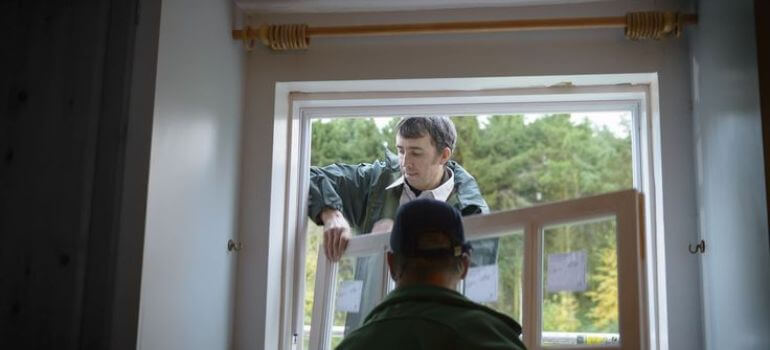Replacement windows fit into existing frames, while new construction windows require a bare frame. Knowing the difference ensures appropriate installation for your home’s needs.
Selecting between replacement and new construction windows is a crucial decision for any homeowner planning a renovation or building a new house. Replacement windows are designed to be installed where the old ones were, using the existing window frame if it’s still structurally sound and not significantly out of square.
They’re ideal for quick updates and are generally more cost-effective if the existing frames are in good condition. On the other hand, new construction windows are used in new homes or additions and are installed directly onto the framing, which means they come with a nailing fin to secure them in place. They’re best when you’re replacing severely damaged windows or during extensive remodeling projects where the wall is stripped to the studs. This initial choice impacts not just the installation process, but also the budget, timeframe, and ultimate performance of your windows.
Factors To Consider

Deciding between replacement windows and new construction windows can impact your home’s aesthetics, energy efficiency, and budget. Both options offer a fresh look, but several critical factors play a vital role in determining the best choice. Considerations range from cost implications to the complexities of the installation process. By analyzing each element closely, homeowners can make an informed decision that suits their needs and preferences.
Cost
The financial aspect is often a top priority for homeowners. Replacement windows can be more cost-effective in the short term, requiring less labor and fewer materials since they are designed to fit into existing window frames. In contrast, new construction windows often necessitate the removal of siding and potentially more extensive adjustments to the home’s structure, which can increase the overall costs.
| Type of Window | Relative Cost | Additional Considerations |
|---|---|---|
| Replacement Windows | Lower upfront cost | May not require structural alterations |
| New Construction Windows | Higher upfront cost | Potential modifications to the building’s frame |
Installation Process
The complexity and duration of the installation process is another crucial factor. Replacement window projects can often be completed quickly, minimizing disruption to the household. These installations utilize existing openings and avoid major construction.
- Measure existing frames for accurate fit
- Remove old window sashes and track
- Install the new window into the existing frame
- Seal and finish for weather-tightness
New construction windows, in contrast, involve a more involved installation process, which typically includes:
- Removal of exterior materials like siding or stucco
- Preparing the rough opening to match the new window size
- Securing the window directly to the framing
- Sealing, insulating, and applying new interior and exterior trim
Whether opting for either, enlisting professional help ensures accurate installation that adheres to local building codes and manufacturer guidelines. This not only guarantees the windows perform optimally but also maintains the integrity and value of your home.
Advantages And Disadvantages
Choosing between replacement windows and new construction windows can significantly impact both the aesthetics of a home and its energy efficiency. Understanding the advantages and disadvantages of each window type is crucial for homeowners who are upgrading their properties or building a new structure from the ground up. Presented in the following sections are key considerations to keep in mind.
Advantages Of Replacement Windows
- Cost-Efficiency: Typically more affordable than new construction windows, replacement windows fit into existing frames.
- Less Intrusive Installation: With no need for exterior construction, installation is quicker and does not disturb the home’s exterior.
- Energy Savings: High-quality replacements come with improved insulation features, leading to better energy efficiency.
- Variety: A wide selection of styles, colors, and materials to match existing home decor is available.
Disadvantages Of Replacement Windows
- Limited Customization: Bound by the existing frame dimensions, there may be constraints on sizing and shape options.
- Potential for Reduced Glass Area: Fitting into an existing frame can sometimes lead to a smaller glass surface area, affecting natural light.
- Existing Frame Condition: If the existing frames are damaged or not square, it can result in poor window performance or the necessity for additional work.
Advantages Of New Construction Windows
- Perfect Fit: Designed for new openings, these windows ensure a perfect fit and optimal performance.
- Customization: Offers the flexibility to choose any size, style, and placement, ideal for personalized design and architecture.
- Structural Integrity: Integration with the house’s frame can reinforce the overall building structure.
- Advanced Features: Typically equipped with the latest advancements in window technology and energy efficiency.
Disadvantages Of New Construction Windows
- Higher Cost: Often more expensive due to the complexity of installation and construction work required.
- Installation Time: The process is more time-consuming, requiring removal of the existing window and often modification of the surrounding frame and walls.
- Construction Impact: Installation can cause significant disruption, possibly affecting the home’s siding and interior walls.
- Permit Requirements: Some local jurisdictions may require permits for new construction windows, adding to the project timeline and cost.
Frequently Asked Questions Of Replacement Vs New Construction Windows
What Is Difference Between Replacement And New Construction Windows?
Replacement windows fit into existing window frames. New construction windows are designed for newly built homes or additions, requiring attachment to exposed studs and framing.
Is It Worth Replacing Builder Grade Windows?
Replacing builder-grade windows can be worthwhile for energy efficiency, comfort, and home value enhancement. Higher quality windows provide better insulation and can reduce energy bills, making the investment beneficial.
Are Replacement Windows Worth It?
Yes, replacement windows are often worth it as they can improve energy efficiency, enhance home comfort, and increase property value.
Do Replacement Windows Add Value?
Yes, replacement windows can increase home value by enhancing energy efficiency, curb appeal, and overall comfort. They are a smart investment for homeowners looking to improve their property’s marketability and functionality.
Conclusion
Deciding between replacement and new construction windows involves evaluation. Consider your home’s structure, budget, and long-term goals. Replacement windows offer a quick upgrade, while new construction windows provide a fresh start. Ultimately, the choice reflects your needs and desires for comfort, efficiency, and aesthetic appeal.
Make an informed decision for a sound investment in your home.



